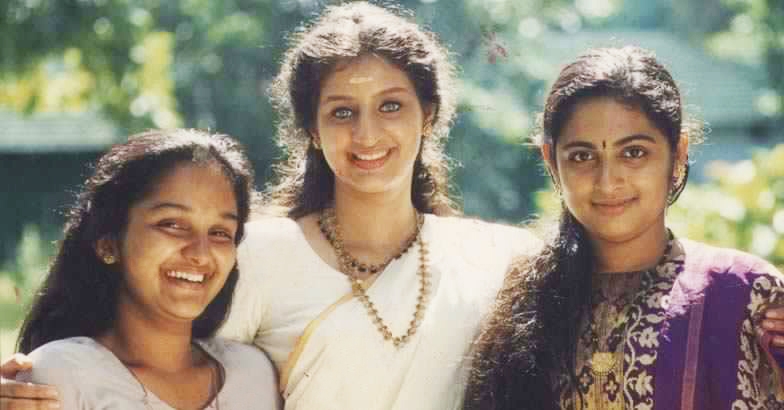
India’s cinema industry is one that rarely commends its writers. Films are often said to belong to the lead male actor or, at best, the director if he/she happens to be prolific. In a notable exception, MT Vasudevan Nair is one writer who elevates the value of a film the moment he associates with one. Seeped in Kerala’s rural roots, his magnificent oeuvre in literature and cinema is well-documented and credited. Therefore, it was a matter of great joy when the wordsmith decided to abridge one of his much-loved short stories into a full-fledged screenplay in Hariharan’s Ennu Swantham Janakikutty.
Set somewhere in Kerala’s Thrissur district, Ennu Swantham Janakikutty is told through the adolescent central character. Fondly called Janootty (Jomol), the bespectacled 9th-grader is unheeded in her own home for various reasons. In occasional instances of breaking the fourth wall, Janakikutty herself reveals how every person at her parental home breeds their own little agendas. She is aware of being less attractive in comparison to her well-groomed sisters. However, the quick-witted, well-read, and sharp teenager that she is, Janakikutty makes no bones to look down upon her the very same women. The nonchalant protagonist also harbours a secret affection for the family valet’s son Bhaskaran (Sarath).
The Matrilineal Household
In the initial minutes, MT and Hariharan introduce us to the environment, the characters, and their general feelings for each other. The matrilineal family has husbands working in distant places. The lady of the house, Meenakshi (Ponnamma Babu) is married to a wealthy NRI, Madhavan (Shivaji). Relatively short-tempered, her life revolves around their only daughter Sarojini (Rashmi Soman). Meenakshi’s younger sibling Kunjootti (Manka Mahesh) is hassled – for myriad reasons: a possibly astray husband, an unemployed son, an unmarried second daughter, and a persistently diseased youngest child. The notable variance in wealth as compared to her sister is also a matter of heartburn but Kunjootty seldom expresses her anguish.
Through a melodious musical number, director Hariharan takes us through the accompanying grove around Janakikutty’s home. She hops around munching guavas, looking for squirrels and parakeets. In her own admission, no one at home has got time for her. Why should she be meditating indoors?
The Arrival of Muthassi
Ennu Swantham Janakikutty’s plot begins to take shape when Janootty’s maternal grant-aunt Unichiri (Valsala Menon) enters the plot. One whom Janakikkutty fondly calls Muthassi, Unichiri is not the ordinary octogenarian. Notorious for eloping with a Tamilian worker at her ripe age, Muthassi is also known to have caused heartache to her own sister – Meenakshi and Kunjootty’s mother. Saddled by old age and abandoned by her own children, Muthassi seeks solace in her own maternal home – the home that she grew up in. Initially reluctant, Meenakshi and Kunjootty eventually decide to let her live with them.
It is Muthassi who opens up a vivid kaleidoscope of fantasies in Janakikutty’s imaginative mind. Be it the mythical tale of Kunjathol – The Yakshi and her accomplices or about the ways of coquettish household helps who seduce rich and healthy men, Muthassi’s stories contribute in weaving ideas in the young girl’s pubescent mind.
Also an avid reader of Kottarathil Sankunni’s Aithihyamala, Janakikutty unknowingly learns about supernatural beings. Until she comes face to face with the angelic Kunjathol (Chanchal) herself.
The Truthful Yakshi
Kunjathol, as most Yakshis are known to be, is fond of chewing tobacco with betel leaves. During their first encounter, Kunjathol expresses her affection for Janootty as she knew how marginalized a being she is in the large, affluent family. A victim, an object of ridicule, predominantly lonely, Janootty often receives brickbats for speaking her mind – something that Kunjathol herself would equate to. Post exchanging pleasantries, Kunjathol introduces Janootty to her ‘Woman Friday’, Karineeli. It is to be noted how friendly Yakshi, belonging to the Namboodiri clan, literally has a servant equivalent from a lower caste. Their difference in attire, names, and lingo explains the well-demarcated social construct within which the lower castes serve their upper counterparts. Even if they happen to be supernatural beings!
Kunjathol requests Janootty to bring murukkan (tobacco-betel) without anyone’s notice while also inviting her to be a playmate. Janakikutty is perennially scared whether Kunjathol will ever take out her infamous damshtras that she is known to use for killing menfolk. Upon realizing Kunjathol’s detest for the opposite gender, Janakikutty is quick to add that there exist evil women too.
Ravishing Female Housekeepers
Having been aware of Malayalam literature and cinema from the yore, I observe how housekeepers often find themselves in midst of heavy stereotypes. A common prototype is one that gets seduced by their sex-starved young masters, later gets pregnant, and are eventually ousted from the family and social circles.
In the highly women-led canvas that MT Vasudevan Nair sculpts in Ennu Swantham Janakikutty, the story projects somewhat opposite shades for this clan. Be it in Kunjathol’s backstory or in Janakikutty’s immediate family, housekeepers are addressed as urvashis who are known to tantalize the sanest of men. It’s as if a part of their job role demanded using sexuality to milk necessary favours. Muthassi even mentions how the sensuality quotient is passed on through generations of housekeepers. This could also be a misconception that upper-class women in wealthy families bred within themselves. However, they do not hesitate to pass on this ‘knowledge’ to the growing up lot.
Teenage Love, With Its Innocence Intact
It was not just Janakikutty who was in love with Bhaskaran. Her first cousin Sarojini, too, finds the first taste of infatuation in the young lad. While their liaisons remain devoid of a done-to-death love triangle clash, it cannot be denied how the seemingly straightforward Bhaskaran is a clever tease when it comes to flooring these women, whose families enjoy higher social status than this. As their interactions begin, Bhaskaran repeatedly calls out to Janakikutty as a child – who he assumes to probably fancy gifts such as chocolates and comics. It is only after Sarojini’s sudden arranged marriage that he begins to treat the teenaged girl as an equal. Did he do so with an agenda? Only MT would tell us.
Domestic Tedium and Unmarried Women
Ennu Swantham Janakikutty also spectacles the familial status of young women Malayali women in mid-’90s and were of marriageable age. Sarojini is appreciated to be well-adorned and made up, even as she sashays around her home. Her pleats are intact and her clothes impeccable. However, her request to invest in a television set is promptly denied. One can observe how the elderly decision-makers shell out money looking at their long-term worth.
Sarojini’s younger cousin Devu, on the other hand, is constantly flipping through film magazines, dancing to Bollywood hits besides occasional outings with Sarojini. Both women could not sail through the dreaded tenth standard and their impending marriage is more of a headache to the family matriarchs. Janakikutty, on her part, never really gets their psyche, and understandably so. These women consciously ignore Janakikutty and she, in return, finds them narcissistic and arrogant.
Not Without Regular Horror Film Tropes
Janakikutty is a loner. She lives in a huge bungalow and has stopped yearning for company. Instead, she finds comfort in the courtyard, the birds, the fruit trees, and the likes. She is often deeply invested in reading fiction that abounds in superstitions. When the distant grandmother turns up to live with them, Janakikutty’s penchant for the supernatural gets charged all the more.
The white-clad spirit (Kunjathol) is no less a stereotype. Complete with mirror-like light eyes, Kunjathol is fiercely protective of people who are kind to her. She keeps vengeance against men and her other dislikes are clearly stated too. Not to mention the frightening damshtras. Local priests and sorcerers are constantly employed by Janakikutty’s family to exorcise the alleged spirit out of her body.
When Janakikutty Comes of Age
A synergy of multiple genres, Ennu Swantham Janakikutty is also about the lead protagonist’s evolution from a bickering adolescent to a fine lady. As the film commences, we see how Janakikutty begins to speak to the audience. It is as if the viewer is her friend in absence of the ones around her. It is almost like a cinematic rerun of Madhavikutty’s Balyakalasmaranakal with the era and incidents changed. The locales and family orientation, more or less, remain interestingly similar and so are their names. Eventually, with Janakikutty’s experiences, the screenplay outlines her journey into womanhood seamlessly. The youngster not only becomes more fearless about her choices but also turns more compassionate and less needy.
Celebrating the Power of Womanhood…
Ennu Swantham Janakikutty is one film that is willfully crafted to empower its women viewers. Within the matrilineal family framework, the positive and negative protagonists in the film are predominantly women.
Women, in all their might, comfortably sideline the men in the house despite their occasional financial dependency on them. Ennu Swantham Janakikutty depicts a world where women run the system, with men rendered as mere providers. This makes the film worthy of a tribute on the occasion of International Women’s Day.
ALSO READ: ‘Meera’ and ‘Viridiana’: Through the prism of religion and faith


Tusshar Sasi, thanks for the article post.Really thank you! Great.
This was one of my childhood favorites. I really want to see it now but I can`t find it anywhere online. Where did you see it ? Could you please help me ?
The film is available on VCD at several retail outlets in Kerala. I had purchased my copy about 9 years ago.
Hey i cant find it any retail shops either can you help me?
Wonderful write up… One of my childhood favorites